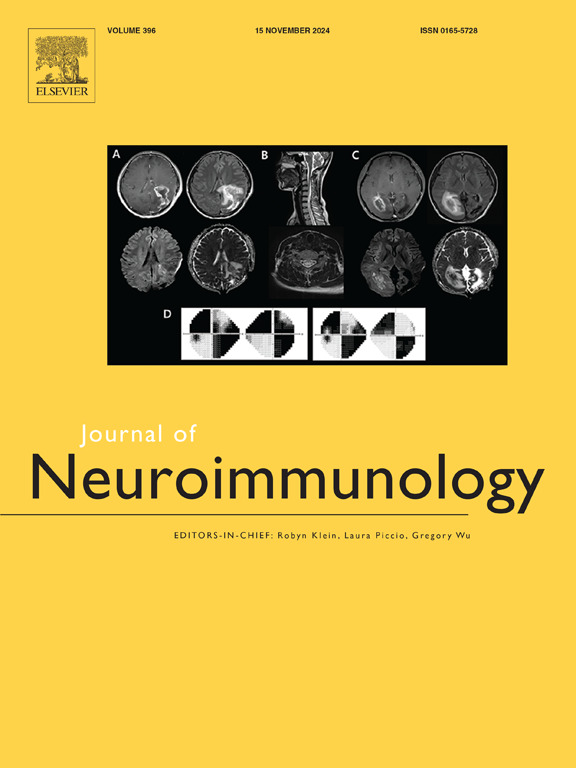Elevated serum levels of IL-10 family and IL-12 family cytokines in myasthenia gravis
IF 2.9
4区 医学
Q3 IMMUNOLOGY
引用次数: 0
Abstract
Background
IL-10 and IL-12 family cytokines play important roles in various immunological diseases. This study identified a relationship between IL-10 and IL-12 family cytokines and the pathogenesis of myasthenia gravis (MG).
Methods
We measured IL-10 and IL-12 family cytokines levels in 25 treatment-naive MG patients with acetylcholine receptor (AChR) antibodies and 28 controls and examined their relationships with clinical parameters.
Results
Serum levels of IL-10, IL-12p40, IL-12p70, IL-20, IL-22, IL-26, IL-28A, IL-29, and IL-35 were significantly higher in MG group than in control group. Among these, IL-20, IL-26, IL-28A, and IL-29 levels decreased after immunotherapy. AChR antibody titers were negatively correlated with levels of IL-12p40, IL-22, and IL-26. Scores on the MG activities of daily living (MG-ADL) scale were negatively correlated with IL-20 levels.
Conclusion
Serum levels of IL-10 and IL-12 family cytokines were elevated in MG. In particular, IL-12p40, IL-20, IL-22, and IL-26 levels might be potential disease biomarkers in MG patients.
重症肌无力患者血清IL-10家族和IL-12家族细胞因子水平升高
il -10和IL-12家族细胞因子在多种免疫性疾病中发挥重要作用。本研究确定IL-10和IL-12家族细胞因子与重症肌无力(MG)发病机制的关系。方法检测25例初发MG患者和28例对照患者血清中IL-10和IL-12家族细胞因子水平,并探讨其与临床参数的关系。结果MG组患者血清IL-10、IL-12p40、IL-12p70、IL-20、IL-22、IL-26、IL-28A、IL-29、IL-35水平均显著高于对照组。其中,免疫治疗后IL-20、IL-26、IL-28A和IL-29水平下降。AChR抗体滴度与IL-12p40、IL-22、IL-26水平呈负相关。MG日常生活活动(MG- adl)量表得分与IL-20水平负相关。结论大鼠血清IL-10、IL-12家族细胞因子水平升高。特别是,IL-12p40、IL-20、IL-22和IL-26水平可能是MG患者潜在的疾病生物标志物。
本文章由计算机程序翻译,如有差异,请以英文原文为准。
求助全文
约1分钟内获得全文
求助全文
来源期刊

Journal of neuroimmunology
医学-免疫学
CiteScore
6.10
自引率
3.00%
发文量
154
审稿时长
37 days
期刊介绍:
The Journal of Neuroimmunology affords a forum for the publication of works applying immunologic methodology to the furtherance of the neurological sciences. Studies on all branches of the neurosciences, particularly fundamental and applied neurobiology, neurology, neuropathology, neurochemistry, neurovirology, neuroendocrinology, neuromuscular research, neuropharmacology and psychology, which involve either immunologic methodology (e.g. immunocytochemistry) or fundamental immunology (e.g. antibody and lymphocyte assays), are considered for publication.
 求助内容:
求助内容: 应助结果提醒方式:
应助结果提醒方式:


